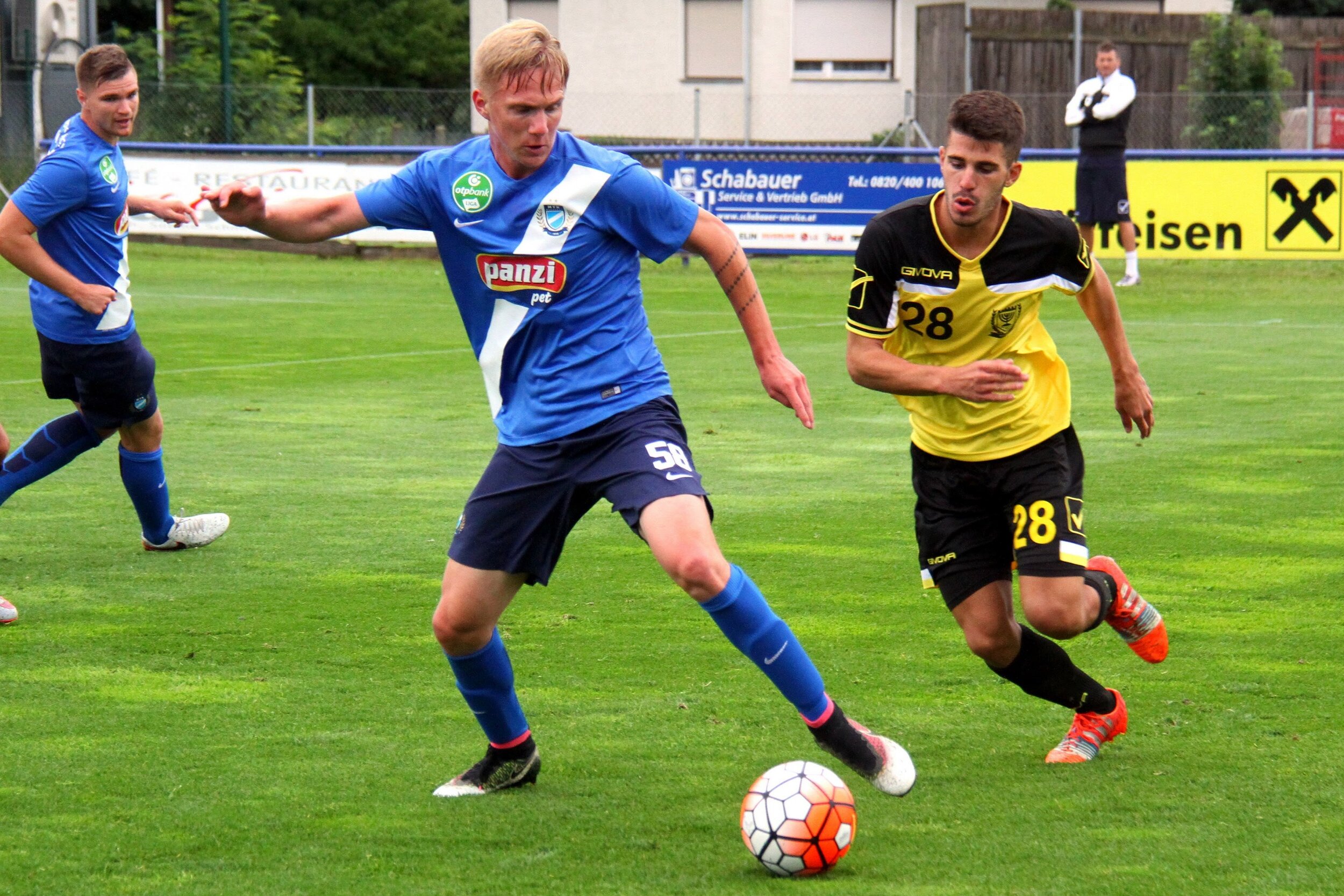Fans are none too pleased. Beitar Jerusalem faces a tough fight against bigotry in its ranks.
A Beitar Jerusalem player, right, tries to keep up. Steindy. CC BY-SA 3.0.
Most sports fans would rejoice at such a deal. Beitar Jerusalem, an Israeli soccer team, got a new owner who pledged a $100 million investment in the team over the coming 10 years. Such a whopping sum of money could buy plenty of talent to buoy the team, which hasn’t won the Israeli Premier League since 2008. Instead of glee, though, many fans felt rage. One diehard spray-painted on the team’s stadium wall, “The war has just begun.” The reason was simple: the new owner was Sheikh Hamad bin Khalifa Al Nahyan, an Arab Muslim, and the team was Beitar Jerusalem, notoriously known as “the most racist team in Israel.”
Heckling Arab players is part and parcel of the stadium experience. Fans regularly shout “terrorist” at rival Arab players. The team remains ethnically homogeneous since it has never signed an Arab player. This flies in the face of statistical probability given that Israel’s population is 21% Arab. The team’s racial uniformity keeps with the team’s motto: “Forever Pure.”
A Beitar Jerusalem bumper sticker. zeeveez. CC BY 2.0.
To understand why Sheikh Hamad bought a 50% stake, it is necessary first to look at Moshe Hogeg, formerly the team’s sole owner. He made his fortune trading cryptocurrency and bought Beitar Jerusalem, along with its debt, for $7.2 million in 2018. His reasons were clear, ambitious and abrasive to many Beitar fans: “I saw this problem that reflects bad not only on the club, but also on Israel,” Hogeg said. “I love football, and I thought it was the opportunity to buy this club and to fix this racist problem. And then I could do something that is bigger than football.” Before he can even dream of something bigger, though, he’ll first have to address the bigotry already present in the team’s fan base.
Beitar Jerusalem’s self-avowed racist identity comes from a right-wing section of the fan base known as La Familia. Comprising roughly 20% of the team’s fans, they are a loud, vociferous and sometimes violent minority. When the team signed two Muslim players from Chechnya in 2013, members of La Familia burned down the team’s headquarters in retaliation. Fans routinely heckled the players during games. When one player scored his first goal, many fans, led by La Familia, left the stadium.
The tumultuous 2013 season was chronicled in the documentary “Forever Pure.”
Under pressure. Steindy. CC BY-SA 3.0.
The deal with Sheikh Hamad comes on the heels of the Abraham Accords, a set of agreements between Israel and the United Arab Emirates, brokered by the United States, that normalized relations between the two countries. Thousands of Israelis traveled to the UAE shortly after the agreements came into effect. Instagram influencers posted stories of themselves lounging in hotel suites in Dubai. Sheikh Hamad’s purchase of Beitar Jerusalem’s stake provoked very little attention in the UAE. Israeli football is not internationally popular, so the outcry was limited solely to Israel.
Beitar Jerusalem’s training ground, site of many racist chants. zeevveez. CC BY 2.0.
Sheikh Hamad is as hopeful as Moshe Hogeg about purging the team of its racist elements. “The deal is meant to show the nations that the Jewish and the Muslim can work together and be friends and live in peace and harmony,” Hamad said in December. However, peace and harmony still seem a long way away. Beitar Jerusalem’s decadeslong right-wing identity defines much of the team’s fan base. As embarrassed and ashamed as most fans are of La Familia’s overt bigotry, the group still holds immense sway. Only time will tell if their brand of hatred will win out. Hogeg and Sheikh Hamad’s anti-racism campaign will face fierce opposition. When asked if his decision to invest was related to La Familia, Sheikh Hamad only responded, “Challenge accepted.”
Michael McCarthy
Michael is an undergraduate student at Haverford College, dodging the pandemic by taking a gap year. He writes in a variety of genres, and his time in high school debate renders political writing an inevitable fascination. Writing at Catalyst and the Bi-Co News, a student-run newspaper, provides an outlet for this passion. In the future, he intends to keep writing in mediums both informative and creative.















